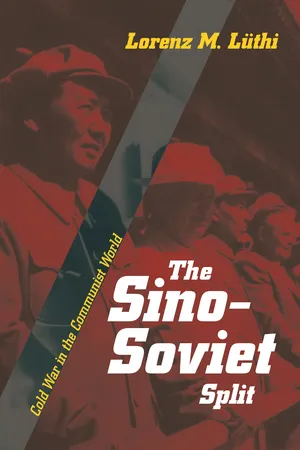
- 400 pages
- English
- PDF
- Available on iOS & Android
About this book
A decade after the Soviet Union and the People's Republic of China established their formidable alliance in 1950, escalating public disagreements between them broke the international communist movement apart. In The Sino-Soviet Split, Lorenz Lüthi tells the story of this rupture, which became one of the defining events of the Cold War. Identifying the primary role of disputes over Marxist-Leninist ideology, Lüthi traces their devastating impact in sowing conflict between the two nations in the areas of economic development, party relations, and foreign policy. The source of this estrangement was Mao Zedong's ideological radicalization at a time when Soviet leaders, mainly Nikita Khrushchev, became committed to more pragmatic domestic and foreign policies.
Using a wide array of archival and documentary sources from three continents, Lüthi presents a richly detailed account of Sino-Soviet political relations in the 1950s and 1960s. He explores how Sino-Soviet relations were linked to Chinese domestic politics and to Mao's struggles with internal political rivals. Furthermore, Lüthi argues, the Sino-Soviet split had far-reaching consequences for the socialist camp and its connections to the nonaligned movement, the global Cold War, and the Vietnam War.
The Sino-Soviet Split provides a meticulous and cogent analysis of a major political fallout between two global powers, opening new areas of research for anyone interested in the history of international relations in the socialist world.
Tools to learn more effectively

Saving Books

Keyword Search

Annotating Text

Listen to it instead
Information

Table of contents
- Cover
- Contents
- Maps
- Acknowledgments
- Abbreviations and Terms
- Transliteration and Diacritical Marks
- Introduction
- CHAPTER ONE: Historical Background, 1921–1955
- CHAPTER TWO: The Collapse of Socialist Unity, 1956–1957
- CHAPTER THREE: Mao's Challenges, 1958
- CHAPTER FOUR: Visible Cracks, 1959
- CHAPTER FIVE: World Revolution and the Collapse of Economic Relations, 1960
- CHAPTER SIX: Ambiguous Truce, 1961–1962
- CHAPTER SEVEN: Mao Resurgent, 1962–1963
- CHAPTER EIGHT: The American Factor, 1962–1963
- CHAPTER NINE: Khrushchev's Fall and the Collapse of Party Relations, 1963–1966
- CHAPTER TEN: Vietnam and the Collapse of the Military Alliance, 1964–1966
- Conclusion
- Essay on the Sources
- Index
Frequently asked questions
- Essential is ideal for learners and professionals who enjoy exploring a wide range of subjects. Access the Essential Library with 800,000+ trusted titles and best-sellers across business, personal growth, and the humanities. Includes unlimited reading time and Standard Read Aloud voice.
- Complete: Perfect for advanced learners and researchers needing full, unrestricted access. Unlock 1.4M+ books across hundreds of subjects, including academic and specialized titles. The Complete Plan also includes advanced features like Premium Read Aloud and Research Assistant.
Please note we cannot support devices running on iOS 13 and Android 7 or earlier. Learn more about using the app